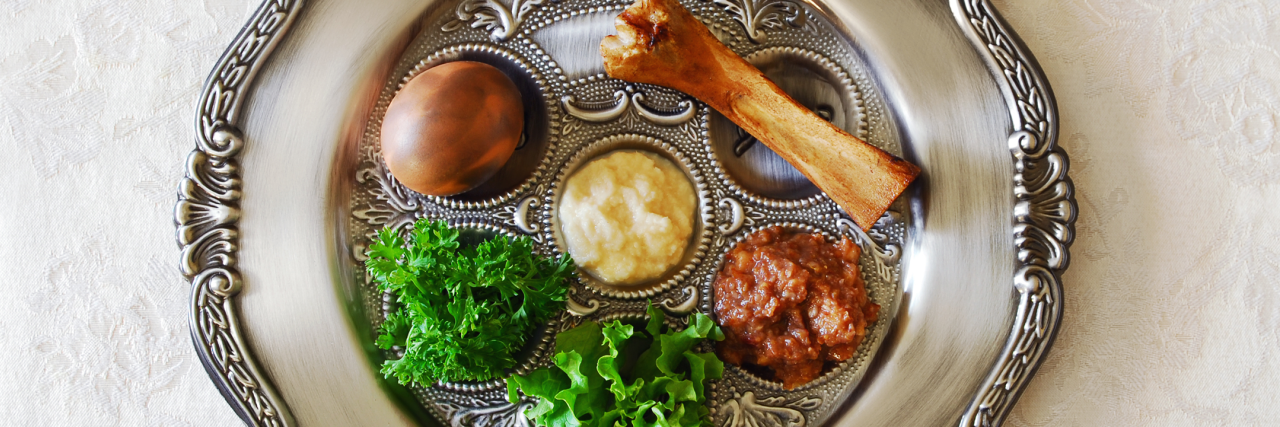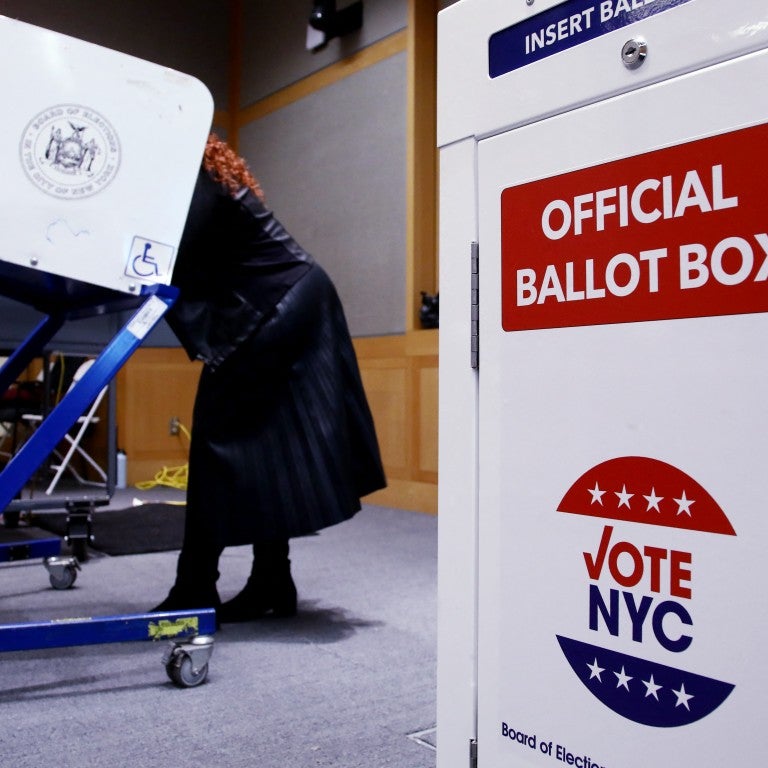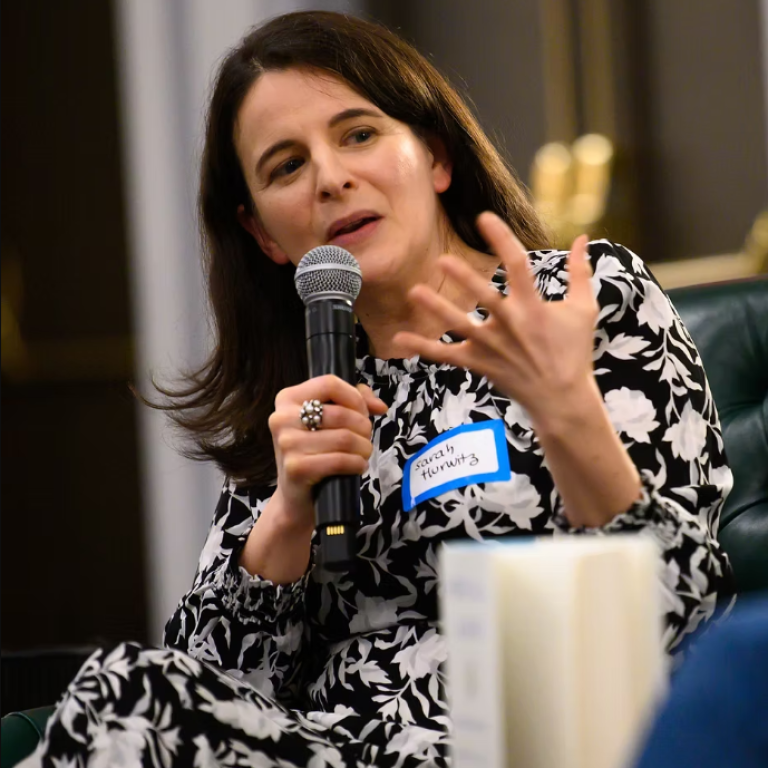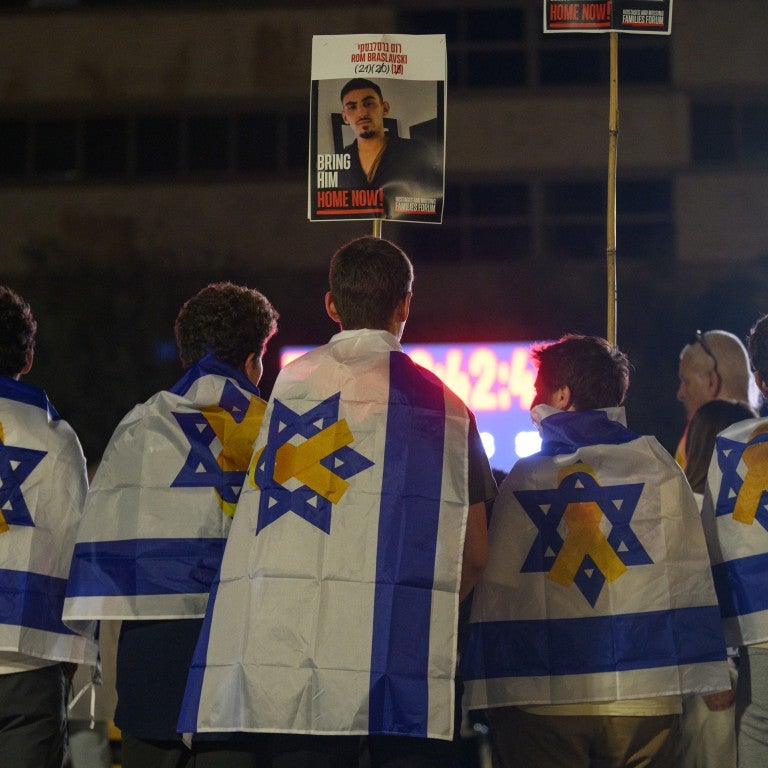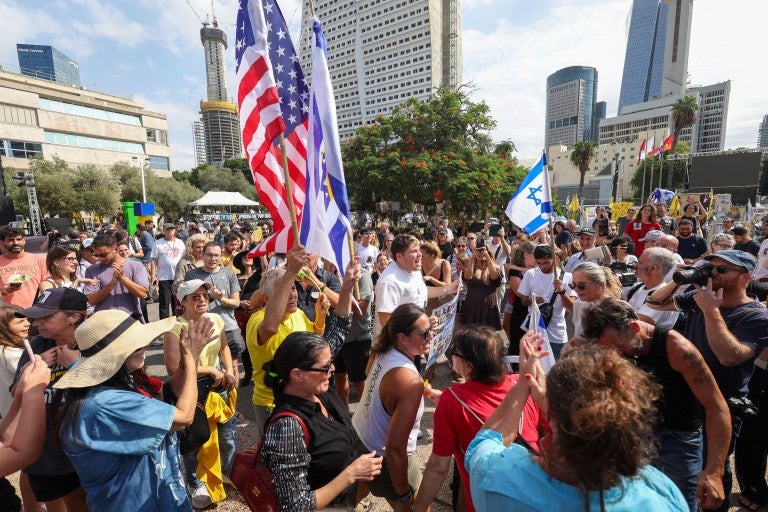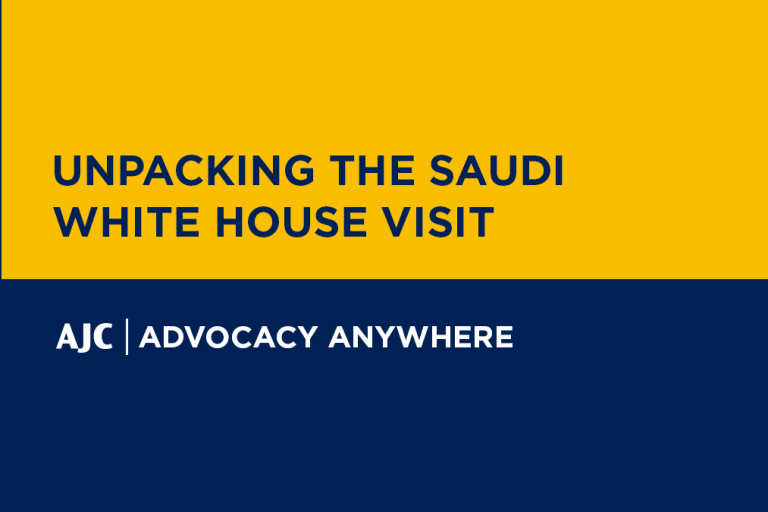April 19, 2024
Ancient texts, traditional foods, and friends and family: the markers of many Passover tables across America. But what if you added something new–or rather, someone new?
Marnie Fienberg founded 2ForSeder, a program to combat antisemitism and honor her mother-in-law, Joyce Feinberg, who was one of the 11 victims murdered inside Tree of Life. The initiative is simple: extend a Seder invite to two people of another faith, who have never been to a Seder before, to build bridges and spread Jewish joy.
*The views and opinions expressed by guests do not necessarily reflect the views or position of AJC.
Episode Lineup:
- (0:40) Marnie Fienberg
Show Notes:
Learn more:
- 2ForSeder.org
- Listen to AJC Remembers The Pittsburgh Synagogue Shooting at Tree of Life, an award-winning podcast series exploring how the horrific shooting affected the Jewish community in Pittsburgh, the U.S., and around the world.
Listen to AJC’s People of the Pod:
- What the Iranian Regime’s Massive Attack Means for Israel and the Region
- Meet Modi Rosenfeld – the Comedian Helping the Jewish Community Laugh Again
- A Look Back: AJC’s Award-Winning “Remembering Pittsburgh” Series
- Jewish College Student Leaders Share Their Blueprint for Combating Antisemitism
Follow People of the Pod on your favorite podcast app, and learn more at AJC.org/PeopleofthePod
You can reach us at: peopleofthepod@ajc.org
If you’ve appreciated this episode, please be sure to tell your friends, and rate and review us on Apple Podcasts.
Episode Transcript:
Manya Brachear Pashman:
A few weeks ago, we re-aired excerpts from our award winning series Remembering Pittsburgh, which marked five years since the 2018 shooting at the Tree of Life synagogue. One of our guests in that series has returned today. Marnie Feinberg founded 2ForSeder, an initiative to honor her mother in law, Joyce Feinberg, who was one of the 11 victims murdered inside Tree of Life. As we approach Passover, Marnie is with us now to share why there's no time like the present to invite first timers to the Seder table, a superb way to introduce people to the beauty of Judaism, like Joyce often did. Marnie, thank you for joining us again.
Marnie Fienberg:
Thank you so much for having me.
Manya Brachear Pashman:
So we spoke a little about this project, when you joined us last fall. We have a little more time now to unpack why this initiative is such a meaningful way to preserve Joyce's legacy. Can you tell us about her Seders?
Marnie Fienberg:
My mother in law as most mothers and mother in laws, she trained me on how to actually hold the Seder. So as you know, holding the Seder is almost like your second bat mitzvah, it's a rite of passage. And it's also a very important thing that, you know, not only are you trained to do it, but you have to incorporate things from, if you have a partner or from their family, you incorporate things from your own life to your family traditions. And all that kind of comes together in this wonderful magical night that is really grounded in the Haggadah.
But Joyce was of course instrumental and teaching me my mother lives kind of far away. And Joyce and I actually did Seders together for more than a decade. And they started at her house and gradually kind of came over to my house. But she really she helped me every single step of the way, to the point where when she wasn't there anymore, I almost didn't know how to do it. And I'm every time I'm thinking about the Seder and making a Seder. It's it's with her in my head as it has to be. But I still, you know, all of the traditions that she taught me we still utilize those once again, combined with the ones that I learned from my own family and she is a vise still a vibrant part of our personal Seder.
Manya Brachear Pashman:
So was Joyce in your head still when you found 2ForSeder?
Marnie Fienberg:
Oh, absolutely. Well, I am a Jewish woman. And I can't sit still. I need to do something. We have tikkun olam kind of almost in our DNA. Yes. So I really wanted to not only bring her back, which I think is a natural sort of a feeling. But I also wanted to push back on all of the antisemitism that had removed her from my life.
And people were constantly coming up to me, I mean, the community in Pittsburgh and the community where I live in Northern Virginia, everybody was very supportive. But they were constantly asking me, What can we do? And it took me a little while to realize they didn't, they did mean, what can I do to help you? Of course, they did mean that. But what they really meant was, what can we do to stop this from ever happening again? I don't have the answer for that.
But I thought that the seder kind of came into my mind because I was really inspired by what Joyce always did that she brought students or faculty, you know, because she was a campus researcher, and my father in law was actually at Carnegie Mellon. He was a professor there. And they always had people who weren’t Jewish at our at the table. And the discussions were always not only very interesting, but you always saw a very different perspective, when they participated in something in a ritual that you knew so well. And it really created bonds of friendship, even with people who I didn't know. Which was wonderful.
So that's what I really wanted to encourage, you know, this was 2018 when she was murdered. So 2019 was the Seder and I just wanted to encourage every Jew in America and in Canada, because Joyce was Canadian, that they, if they if they were holding the Seder, invite to people who had never been to a Seder before, start that dialogue, invite them to the intimacy of your home, and make them part of your family for that one night.
And that will really help them understand the joy of Judaism, the happiness and the reason that we are Jewish is, it's right there in the Seder. In every Seder I've ever been to, it's always there, and to share that with someone who is not Jewish, starts the dialogue to understanding about the differences between us, the similarities, all these great things, that this is a thing that combats the hate that took my mother in law.
Manya Brachear Pashman:
These are uncomfortable times, they were certainly uncomfortable back in 2018, when the Tree of Life happened, but they're uncomfortable times again for the Jewish community. For everyone really? Who's watching what's been going on in Israel since October seventh. What does the Seder offer? And how do you avoid some of the pitfalls that can arise? When you do bring people perhaps have different perspectives around a dinner table?
Marnie Fienberg:
I'm glad you asked that question. Because my family and Joyce, you know, we feel very strongly about what's happening in Israel, we have a lot of family over there. A lot of friends, like everyone else, we all know someone in Israel. And it's a part of what's going to happen in your Seder this year, I assume almost everybody's going to do something to remind them about, you know, that the hostages are still not freed, that there are people that are starving, but are being helped. This is a difficult situation, it's not a simple, straightforward thing. And the Seder Absolutely, is a reprieve from that for a moment. I think the idea of the Seder is about reaffirming your Judaism, because it takes you on that journey from when we were a tribe, to a nation. It's that little piece in the middle. But it's when you reaffirm your Judaism every year.
So it's still important to do it. It's so important to do it your way. And if you want to have a reminder of the hostages, an empty seat at the table, something on the Seder plate, there's so many different ways that you could do something. I think that all of those things would be absolutely important right now, something that reminds you that we're doing this, not just for our family, but we're going to be doing this for those families that are missing those members right now. So I think that the the Seder in general will be healing to some extent for everybody who participates. So inviting someone who's never been to a Seder before. I think it's important, not only do you explain the Seder, which you really do need to do, you have to explain it before you start. And then they can participate and feel comfortable. But also explain to them that if you are going to be doing something to remember the hostages and all the people that were lost, let them know ahead of time that that's what you're going to be doing. You don't want to surprise your guests, your other guests will know exactly what you're doing by the guests who are not Jewish. Don't assume that they know, make sure there's great communication, and everything should go very smoothly.
Manya Brachear Pashman:
So I appreciate you kind of mentioning some of the rituals that we can do to honor the hostages and to remind the guests that the hostages are not free. But what about guests who come to the table who have been watching what's going on and disagree. They have really strong emotions and opinions about what's going on there between Israel and Hamas. And I asked this because I know Joyce worked at the University of Pittsburgh, as you said her husband Steven was a professor at Carnegie Mellon. And they often invited students to dinners and Seders. You might have seen the dean of Berkeley Law School has an annual custom of inviting students to his home for a dinner with students. And recently a group accepted that invitation showed up, but then got up from the table and pulled out their megaphones right there in his backyard. So it's hard to believe that that level of rudeness is possible. But it does appear to be a real risk. So can you offer some tools or tips on how to avoid that kind of a response? Or how to respond if you get that kind of behavior?
Marnie Fienberg:
Absolutely. And, you know, it's interesting, I think that we feel a heightened sense of that this year. But it's interesting, that is one of the most asked questions that I always get: How do I ensure that my guests don't veer into politics or if they have disagreements or things along those lines? Probably not the first year so much. But the other years, we've always had questions along those lines. So my recommendation is that you lay some ground rules ahead of time. So as the leader of the Seder, you're not just the head mom or the head Dad, you are the facilitator of what's going on around your table. And while some of us will have five people around the table, some of us will have 30 people around the table, and some of us will be in the backyard with I don't know how many people that the Dean had. But regardless of any people you have, you still have to manage their expectations. It's very important. So when you lay ground rules, it's your choice. You may want to actually have a lively debate. Many Seders are a lot of fun when there's a lot of debate. And if you know the guest, and you know that that's what they're interested in talking about. And the rest of your guests would be okay with it. That is your choice and you should manage that but even with that You might want to say, look, we're going to venture into politics, we can't talk about X, Y, and Z. Or I'll let you know when we've gone too far.
Or, hey, this now it's time to bring out the dessert, because that'll stop everybody from talking. I don't know, that's going to be your choice. There is the other side of the coin. And this is actually I live in Washington, DC, where politics is always quite a big deal. But other politics, right, all sorts of politics. So one of the ground rules we always have at our Passover Seder is to have no politics at all, this is a little island, we're not going to talk about the fact that you might be one party, I might be another party, he is going to be another party and y'all work for those parties. I mean, it's not like these are just opinions. So one of our ground rules is always this is a time to focus on once again, the joy of Judaism, the joy of reaffirming my beliefs, and being with my family. And really kind of feeling like this is a very, very special time. And I personally have never wanted politics at my table, because I want that joy to fall through. But when I've been to other tables, it's been very different. So my ground rules are always this is a politics free space. If you'd like to talk about politics, let's go out for drinks after Passover.
Manya Brachear Pashman:
So it's a great point about being in Washington. But again, there's a chance that politics will be brought up at every table, whether it's California or Nebraska, or Texas or Maine. So if it does get tense if people ignore the ground rules, for example. Any suggestions on what to do?
Marnie Fienberg:
Yes, actually, we do have a couple of tools in our toolkit. So two first Seder, if you go to our website to crusader.org, we actually have two kits, when you hit the signup button, it's two free kits for you. One is for your guests to kind of set expectations about the Seder, not about politics, it doesn't touch about that. But it's still important. But the host kit actually has 20 discussion cards in it. And I would actually recommend it if you've started out with a little bit of excitement with politics, and you don't like the way it's going, or if you want to say, look, I really want to avoid it. But I know, this is a lively crew, which I mean, you know your people, right? So I would actually print them out, put the discussion cards out on the table, and actually start picking up some of them and you know, send them around the table and start having discussions about them. So they are more about the Seder. And some of them are pretty surface level, like, what do you think about the taste of matzah, and you're having a discussion about how all these things are cooked with matzah and how crazy that is and how difficult it is and what a genius your chef must be, you know, so you get to compliment the host or hostess. But on the other side of it, there's some deep waters that it goes into, to really talk about the philosophy behind the Seder in some deeper things.
So you can really choose what you want. There's 20 different discussion cards. And I think when people are having a very tense discussion, if you say, look, I like where this is going. But it's just not appropriate for today. We've got an alternative here. Let's keep talking. But let's talk about these topics. It won't always work. But it tends to work me most people really, you know, they have strong opinions about many things. And that is what the Seder is for, right? We're supposed to be learning, we're supposed to be growing from each other. So if you can change the topic, if you're uncomfortable with it, the discussion cards are a wonderful tool to help kind of guide that.
Manya Brachear Pashman:
Those can be downloaded at the 2ForSeder.org site.
Marnie Fienberg:
Yes, yes, exactly. There's a host toolkit. And it's the last 20 pages of the host toolkit.
Manya Brachear Pashman:
You know, I'm so glad Ramadan has passed so that in a Muslim guests are able to come and enjoy these Seders Without the concern of breaking their fast. But I know that a little has been written about how Jewish Muslim relations have been on edge. And honestly, I have a few Jewish acquaintances who were nervous about attending if tars during Ramadan or weren't invited to as many if tars during Ramadan this year, just because of the potential for tension. Are you hearing any concerns about or from the Muslim community? Or are you hearing that people are sadly turning down invitations for similar reasons?
Marnie Fienberg:
Yeah, I think that as you said, this is a very challenging year. And if you don't feel comfortable, you're not going to a particular place. And I have Muslim friends and normally I am invited to if tours across the month, and I received very few invitations this year, which was interesting. We're still friends. The friendships haven't ceased or anything like that, but the invitations were not their part. To the reason what I did ask part of the reason they felt that they shouldn't be celebrating when people are starving and Palestine so they actually toned down their celebrations out of respect which that's a longer conversation, but I respect that and I appreciate that. Would they be coming to my table? I don't know. We have a community Seder a community to for Seder that we hold every year. So most of to First Aiders about home Seders, you know, so the idea of doing it in your home that is the primary core of twofer Seder. But we've started a nice little thing on the side, where we do a community to for Seder, where everybody we actually invite interfaith groups. The spirit of twofer Seder is about building a bridge. And I hope actually in the past, if you've done too, for Seder before, thank you, but be I hope that those bridges are holding during these troubled times. And if you can't build them during a difficult time like this, you know, I'm hoping I'm praying that next year, there won't be no war, and we'll be able to mend some of these fences and you will be able to invite and accept invitations to Iftar invitations to your Seder for your Muslim friends, I think it's important to keep trying. That's one thing that we are obligated to do as Jews, that may not work, but you'd have to keep trying.
Manya Brachear Pashman:
One thing I've noticed over the years, and the many Seders I've attended is the diversity of traditions and the customs some families put an orange on the table and have a glass for Miriam, other stick to Elijah. So make sure the Afikoman is chocolate, others play it straight. Some change the lyrics of the songs to fit Beyonce tunes, I won't lie I've done that. But does that present a challenge to the purpose or the goal of two for Seder? You know, the goal being to teach a newcomer about Passover? How do you do that? When it's you know, the traditions can be so different.
Marnie Fienberg:
This is also very–well not the Beyonce piece. But that's a very common question. First of all, I want to say I would really like a copy of that, please.
Manya Brachear Pashman:
I'll dig it up for you.
Marnie Fienberg:
Thank you. But that's the whole point that the Seder is blue door for door right we are Lincoln a chain from generation to generation and the core of the Seder the Haggadah, regardless of if you do a traditional haggadah that is, you know, four hours long starts after sunset, maybe you eat by midnight, you know, if you're doing a modern Orthodox or an orthodox Seder, or if you're doing a very, very modern said Seder, which just has the basic four pieces in it. And tik tock you're done. I'm starving. It's been 10 minutes. Welcome to my my dad. Actually, that's the way he does his. But I've been to all different types, because you know, almost all of our Jewish families, we have a variety in our family, we have Orthodox, we have reform, we have everything in between, right? That's what it's about. It's about the magic of what you bring to your Seder. The haggadah is going to ground you, you've got the grounding story about our journey to becoming a people. That's the core, but what you do a round it, that's you, you are bringing you and your family and all the things that bring you joy, into your Judaism, into your Seder. And these things are critical. If you just read the Haggadah, and then you walked away, it wouldn't be joyous it would be yes, I was here Hi. But the joy behind it is removed. So the idea that you know, you almost always have children at your Seder, and there's a rule for the children. Why is that? There's a role for the adults to teach the children. There's the food, there's thinking about the future when you sing Eliyahu with the door open so that your neighbors can hear you and wonder what is going on. I mean, all of these things. There's personal ways to put a stamp on those. But we're going to do those. And even if you do it to Beyonce, once again, very excited to hear that. It's really bringing that modern tinge to it. When we're going to hand the hat over to our children. When they do it. They're going to do something different and there'll be wondering who's Beyonce? That's okay, that's okay. But they're still going to do the for questions.
They're still going to do the Ma Nishtana, they're still going to do the Eliyahu Hanavi, all these pieces will still flow. I have proof of this. When I was working to create the community to for Seder. I wanted to create our own Haggadah, and I use of course haggadot.com To start off with, but I really wanted certain things that weren't in there and and I got stuck and I'm sitting here staring at the screen and my teenage daughter walks in and And she actually wanted to help me right there. I know you don't believe me, but she sat down. She said, How can I help? And I was walking through some of the more traditional lines. I don't know why they always took my heart, you know, where they say, you know, in God with an outstretched arm and outstretched hand and the old language, right? Should I keep it in the Haggadah, or should I not? And she looked at me like I was nuts. And she said, of course, you have to, you must, it won't be the Haggadah without it. And that really made me feel like this is going to pass down, at least in my family. These words are so intrinsic to who we are, somehow it gets passed down. It's amazing.
Manya Brachear Pashman
My last question is, who will be coming to your site or table this year?
Marnie Fienberg:
So I'm holding two Seders, although I'm going to three. The first one is the community Seder that is being held in Temple Emanu-El in South Hills right outside of Pittsburgh. And I'm gonna be sort of emceeing it. And we're going to be using the Haggadah that we talked about. And that will be I think there are three different churches that are joining and all sorts of different folks. And one of the tables is actually just teenagers. So I'm really excited because, you know, sometimes to first seders is of interest to adults, and not so much the younger set. Although at our last community Seder, we had a lot of college kids, we had a huge table of college kids, which was great. So I think that that's gonna be a wonderful Seder. The next Seder is going to be the second night we'll be at my house, my friend is holding it the first night at her house.
Second night will be in my house, we're having 25 people's the current count, although, you know, it's Wednesday, so somebody's gonna have too late of a night or whatever, so they won't be able to come. But we're really excited because this is more even though there will be some family coming in. This is more of like, a friend Seders the second night for us. So it's going to be a wonderful night. Who's gonna be my two for Seder. This is once again through my daughter. She has a friend who is actually Korean, and her family is going to be joining us. I'm so excited her families, they're wonderful folks. And the one thing I'm nervous about is that they are amazing cooks, and I'm not sure if my cooking is going to stand up to their skills. So hopefully it'll all work out. But it's gonna be a lovely night as it always is.
Manya Brachear Pashman:
That sounds truly lovely. 25 people, Marnie, you are a brave woman, a brave hostess.
Marnie Fienberg:
I wish there was one more that was coming, but she will be there in spirit.
Manya Brachear Pashman:
Yes, absolutely. And thank you because I know it's a lot of hard work to put together a Seder. But again, so important it is such an anchor, I think for families and preserving our traditions. So thank you for all that hard work that's going into that Seder.
Marnie Fienberg:
It is my pleasure and I think every single person who's putting together a Seder and participating in to for Seder, if you've done it before, thank you, if you're interested in doing it again, we've got little kids to help you but just be you and it's about inviting new people every year. And that's how we're going to help really make an awareness about what it really is to be Jewish, not what you hear, you know, the negative rumors, replace those with positive Jewish joy.
Manya Brachear Pashman:
Well, thank you so much, Marnie. The website to download discussion cards and toolkits, all the instructions that you need to host a Seder with a guest is at two, the number two for seder.org Marnie, thanks again for joining us.
Marnie Fienberg:
Thank you so much for having me. This was a great discussion.
